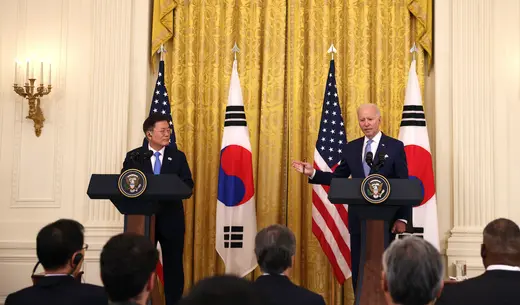The U.S.-South Korea Summit: A Relationship Restored?
Last week’s summit between U.S. President Joe Biden and South Korean President Moon Jae-in aimed to bolster the alliance across a range of issues, with notable moves on supply chain resiliency and North Korea.
By experts and staff
- Published
By
- Scott A. SnyderSenior Fellow for Korea Studies and Director of the Program on U.S.-Korea Policy
In only his second in-person summit, U.S. President Joe Biden met with South Korean President Moon Jae-in last week, seeking to broaden and deepen cooperation with Seoul that is likely to tighten coordination on policy toward North Korea and China-related issues.
In what areas is U.S.-South Korean cooperation likely to increase?
The United States and South Korea pledged a wide range of joint measures during the summit, with the goal of restoring their alliance in response to “contemporary threats and challenges.” Most significantly, the leaders announced bilateral cooperation to integrate approaches to supply chain resiliency, vaccine production, and climate change, which emerged as Biden administration priorities earlier this year during a summit of Quad countries: the United States, Australia, India, and Japan.

Supply chain resiliency. The United States and South Korea announced over $25 billion in investment pledges by companies from both countries to address semiconductor chip shortages and reduce dependency on China for the production of goods involving advanced technologies. This includes South Korean companies’ pledges to build new chip and electric-vehicle-battery manufacturing plants in the United States. The countries committed funds to strengthen the competitiveness of advanced information-communications technologies and next-generation mobile networks. They also pledged to promote research and development (R&D) on emerging technologies, such as artificial intelligence and biotechnology.
Vaccines. The countries agreed to establish a Korea-U.S. Global Vaccine Partnership to combine U.S. technology and South Korean production capacity. The United States said it will immediately provide 550,000 vaccines to South Korea to inoculate the South Korean armed forces. They also vowed to work with like-minded partners to prepare for and mitigate damage from biological threats, including by strengthening global detection and response capacity.
Climate change. The United States secured South Korea’s commitment to announcing its enhanced 2030 targets under the Paris Agreement on climate prior to the twenty-sixth UN Conference of the Parties (COP26) in November. The nations jointly pledged to end new public financing for coal-fired power plants globally and to cooperate on the issue of marine debris and plastic pollution ahead of a South Korea–hosted international conference in 2022.
Other areas. They agreed to enhance space cooperation; establish intergovernmental working groups to address cybercrime and ransomware attacks; promote civil nuclear cooperation in markets abroad; launch U.S.-South Korea Democracy and Governance Consultations to promote democratic resilience, good governance, and democratic institutions; encourage environmental and educational exchanges; create a working group on domestic violence and online abuse; and support development cooperation between the U.S. Agency for International Development (USAID) and the Korea International Cooperation Agency on projects in Southeast Asia.
What did they say about North Korea?
President Biden and President Moon pledged their shared commitment to peacefully achieving the complete denuclearization of the Korean Peninsula through diplomacy with North Korea.
The presidents endorsed the appointment of Sung Kim as U.S. special representative for North Korea, a clear signal to Pyongyang that Washington is prepared to enter into negotiations to achieve denuclearization. The Biden administration’s public endorsement of diplomacy toward the goal of “complete denuclearization” and Biden’s stated openness to meeting with North Korea’s leader if the country moves toward denuclearization obscured possible differences over whether to offer Pyongyang economic incentives to induce a return to denuclearization talks.
What does the summit signal about the U.S. approach to China?
By hosting Japanese and South Korean leaders for the first two White House summit meetings, Biden has signaled his intent to restore U.S. alliances, which are central to his efforts to counter Chinese influence. Biden will likely seek to further deepen and build a coalition of like-minded countries in Asia and Europe in support of a rules-based regional order. This will help his administration tackle his top strategic objective of restoring the credibility of democratic governance models by competing with China in the development of advanced technologies, provision of public goods, and adherence to a rules-based rather than a power-driven approach to international disputes.
By building economic incentives for cooperation with South Korea on supply chain resiliency, the Biden administration is challenging a widely held South Korean premise that the country needs to rely on China for economic opportunity. The credibility of these commitments lies in part with the willingness and follow-through of the South Korean private sector to invest in U.S.-based production to meet supply chain security needs.